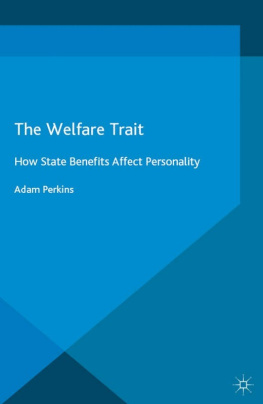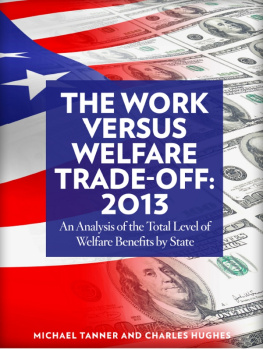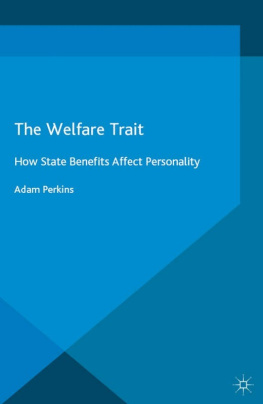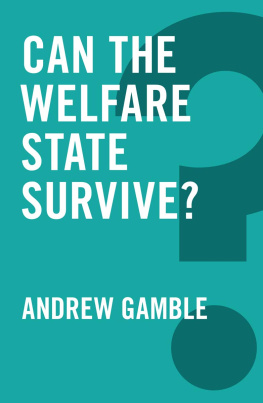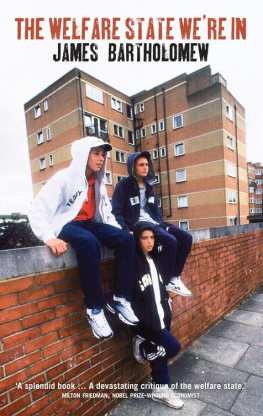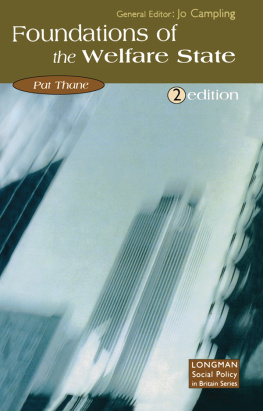The Welfare Trait
The Welfare Trait
How State Benefits Affect Personality
Adam Perkins
Lecturer in the Neurobiology of Personality, Kings College London, UK


Adam Perkins 2016
All rights reserved. No reproduction, copy or transmission of this publication may be made without written permission.
No portion of this publication may be reproduced, copied or transmitted save with written permission or in accordance with the provisions of the Copyright, Designs and Patents Act 1988, or under the terms of any licence permitting limited copying issued by the Copyright Licensing Agency, Saffron House, 610 Kirby Street, London EC1N 8TS.
Any person who does any unauthorized act in relation to this publication may be liable to criminal prosecution and civil claims for damages.
The author has asserted his right to be identified as the author of this work in accordance with the Copyright, Designs and Patents Act 1988.
First published 2016 by
PALGRAVE MACMILLAN
Palgrave Macmillan in the UK is an imprint of Macmillan Publishers Limited, registered in England, company number 785998, of Houndmills, Basingstoke, Hampshire RG21 6XS.
Palgrave Macmillan in the US is a division of St Martins Press LLC, 175 Fifth Avenue, New York, NY 10010.
Palgrave Macmillan is the global academic imprint of the above companies and has companies and representatives throughout the world.
Palgrave and Macmillan are registered trademarks in the United States, the United Kingdom, Europe and other countries.
ISBN 9781137555274 hardback
ISBN 9781137555281 paperback
This book is printed on paper suitable for recycling and made from fully managed and sustained forest sources. Logging, pulping and manufacturing processes are expected to conform to the environmental regulations of the country of origin.
A catalogue record for this book is available from the British Library.
Library of Congress Cataloging-in-Publication Data
Perkins, Adam, 1972 author.
The welfare trait : how state benefits affect personality / Adam Perkins.
pages cm
Includes bibliographical references.
ISBN 9781137555274 (hardback)
ISBN 9781137555281 (paperback)
1. Personality and occupation. 2. Public welfarePsychological aspects. 3. Welfare recipientsPsycology. 4. Welfare recipientsAttitudes. 5. Personality change. I. Title.
BF698.9.O3P46 2015
Illustrations
Figures
Tables
Acknowledgements
Modern science is a matter of teamwork and this book reflects the influence of many people. First, I thank my parents Robert and Kathleen for endowing me through the interaction of nature and nurture with a thirst for knowledge, which is perhaps the most important asset of all for a scientist. They also gave me a belief that the status quo should be questioned as well as the benefit of a stable, supportive and loving childhood home, but without being a soft touch: my employment-resistant personality profile became apparent at an early age and my parents did their best to stamp it out. My sister Katie assisted with that process by setting an example of highly conscientious and agreeable behaviour, but I remain easily distracted and therefore must also thank my aunt and uncle, Barbara and Guy, who helped to save my sanity and this book by providing me with a quiet and internet-free place to write certain particularly difficult sections of the manuscript. The literary world is a complex and strange one to a scientific researcher and I was therefore lucky to benefit from the advice of Mike and Marian Shaw as well as their kind hospitality many years ago when I was a callow and near penniless warehouse worker, newly arrived in London. The bosses of that warehouse were decent enough to employ me for almost three years and at the same time taught me a lot about the world of work: thank you Paul and Anto. Once I entered the world of scientific publishing I was very lucky to benefit from the advice of the established scientific author Professor Tomas Chamorro-Premuzic, who provided many wise suggestions as to how to proceed. I thank the diligent and gifted staff at Palgrave Macmillan who helped to make The Welfare Trait into a book rather than just a series of chapters. In particular, I thank Paul Stevens for spotting the potential of The Welfare Trait as a Palgrave Macmillan book and Nicola Jones for taking time out of her Christmas holiday to read the entire manuscript, a sacrifice that (I hope) was worthwhile, as she provided astute editorial analysis that did a lot to improve the book. Eleanor Christie successfully saw the book through the labyrinth of anonymous peer review I am most grateful to her for undertaking this arduous task, as well as to the three anonymous reviewers whose criticisms were sometimes harsh, sometimes gentle but always useful. As a result of all these efforts, I think this book represents a true meeting of minds between author and publisher and is much the better for it. Before the manuscript was known to the publisher, it had already gone through four drafts drafts that were scrutinised by a doughty group of test readers, namely Alex Douglas, Simon Brunton, Rosalind Arden, Atalanta Arden-Miller and Jonathan OMuircheartaigh. I also thank all those with whom I have had inspiring discussions over the five and a half years it took to write this book, especially Rob Davis, Andy Davis, Emma Wright, Sophie Inchley-Mort, Tim Bates and David Gasston. Last but not least, I salute Professors Philip Corr and James Heckman who have provided me with much of my scientific inspiration.
Preface
As a personality researcher employed at public expense, I feel I have a duty to use my scientific knowledge to try to help improve the prospects of our society. In this book, I explore a topic that is dear to my heart, namely how discoveries from personality research could be used to help improve the welfare state. This topic is especially important to me because for several years before I became established in my scientific career, I worked in a range of low-paid roles and, in between jobs, I claimed unemployment benefits. I am therefore more interested than most academics in seeking to use scientific findings to ensure that the welfare state is there to look after future generations, like it was there to look after me. This book was also motivated by my frustration at ill-informed personality-related stereotypes of welfare claimants. For example, we sometimes see welfare claimants stereotyped as genetically hardwired to be unconscientious and disagreeable, shunning work for a life of idleness courtesy of the public purse. Conversely, welfare claimants may be portrayed as the helpless victims of capitalism, mere leaves blown around by the powerful winds of the global economy. As I am both a personality researcher and a former welfare claimant, I have a stake in both aspects of this topic and I can therefore see from my own experiences how important the details are. For example, as the data summarised in this book show, welfare claimants on average do possess a personality profile that is less conscientious and agreeable than that of employed citizens, but genes dont have much to do with this the environment is much more important. The global economic situation of course forms part of our environment, but so does the welfare state and, as I hope to show, the latter factor has a crucial role to play in shaping the personality profile of the population.
What Is Personality and Why Does the Welfare State Matter?
Next page
